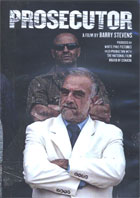
Prosecutor 2011
Distributed by Icarus Films, 32 Court St., 21st Floor, Brooklyn, NY 11201; 800-876-1710
Produced by White Pine Pictures in co-production with the National Film Board of Canada
Directed by Barry Stevens
DVD, color, 94 min. with an alternate 52 min. version
Sr. High - General Adult
African Studies, American Studies, Crime, Criminal Justice, Ethics, European Studies, Holocaust and Genocide Studies, Human Rights, Journalism, Law, Military Studies, Philosophy, Political Science, Post-colonialism
Date Entered: 03/14/2012
Reviewed by Jennifer Dean, MALS student, City Univerity of New York (CUNY Graduate Center)Barry Stevens’ film Prosecutor follows International Criminal Court (ICC) Chief Prosecutor Luis Moreno-Ocampo in an auspicious year for the court where their first cases are tried (on both sides of the Congo war) and the leader of the Sudan, Omar Al Bashir is indicted. The film interweaves personal insights into the man who heads up this controversial organization with questions regarding the efficacy of the court and the philosophy behind its existence. At points Moreno-Ocampo the man seems impenetrable despite Stevens’ access to him. This doesn’t detract from the documentary, however, but only adds to the understanding of the necessary single-mindedness of someone in this position. Stevens asks in voice over “How can one prosecutor at a court in the Hague bring justice to a violent world?” This is as true for the organization as it is for the man – and both seem to necessitate a constant fighting for a new paradigm of redress against the reality of the world of war.
Although the documentary clearly mes a case for the necessity of global justice, it presents both sides of the case. An interview with academic and Columbia Professor Mahmood Mandani questions the capability of the court to provide justice. Stevens interviews Sir Geoffrey Nice, former international prosecutor of Slobodan Milošević, who now represents groups opposed to the arrest of Al-Bashir and repudiates the idea of international justice. The inability to enforce the law looms over the court and the indictments it makes. The court is accused by some of being a post-colonialist attempt at imperialism because of their concentration on the atrocities of African nations and their failure to condemn the crimes committed in Afghanistan by US and Canadian troops and by the Israelis in the Gaza strip. Director Barry Stevens does not shy away from these questions.
The full version of the film includes insights from various prosecutors in the office of the ICC – including a young man who, frustrated with the lack of progress at the ICC, leaves to join the UN in enforcement – actually removing child soldiers from danger. All of these additional voices add dimension to the documentary. The 52 minute version is an interesting introduction to the concepts of the longer film and works as a much more tightly structured story of the Chief Prosecutor himself but loses some of the intricate questions raised about the ICC by the longer version.
As telling as what gets filmed are the situations where Stevens and his crew are not allowed access, including a meeting with an expert from the American Center for Law and Justice regarding the Gaza Strip that becomes confidential, a behind closed doors meeting with community leaders in the Congo and the concealed identity of Moreno-Ocampo’s children on a visit from Buenos Aires.
Prosecutor is an insightful film that raises numerous questions about concepts of justice, National identity, systems, politics and the law, lessons learned from Nuremburg and so many other complex philosophical, bureaucratic and practical questions while never losing sight of the humanity of the people at the heart of the story. Stevens includes a shot of Moreno-Ocampo in his home with stacks of Law & Order DVDs in the foreground, a humorous nod amidst the incredibly gravity of the subjects presented in the film. He depicts the human struggle to punish and hopefully prevent future incidents of violence that are “not acts of war but crimes against humanity itself.” Highly recommended.